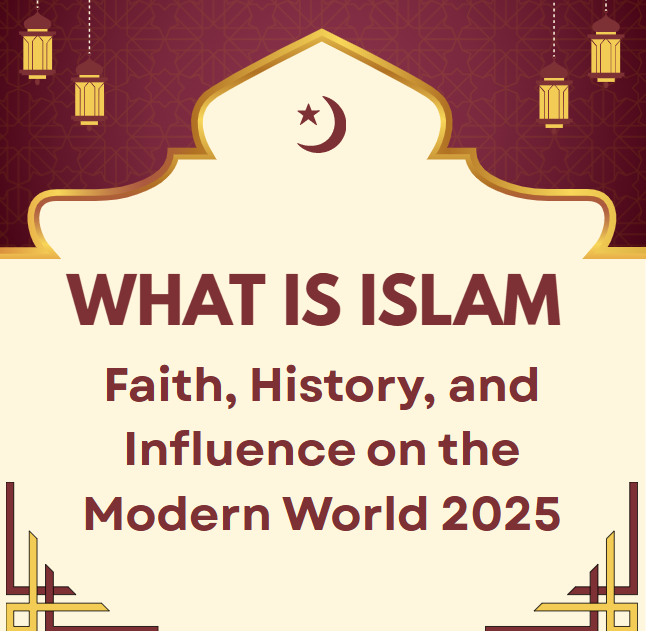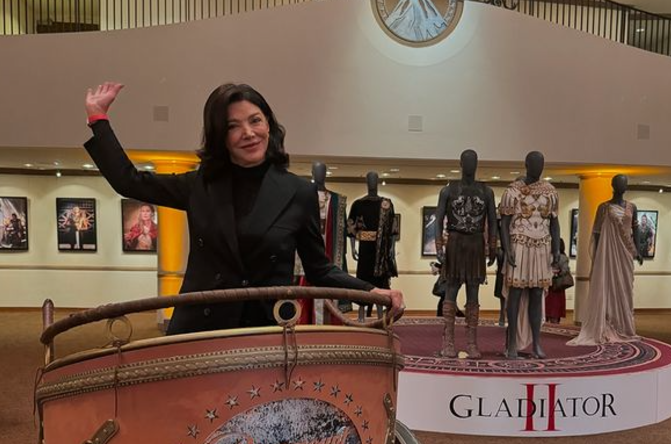What is Islam. Islam is one of the world’s major monotheistic religions, with over two billion followers worldwide, making it the second-largest religion after Christianity. The word “Islam” comes from the Arabic root “S-L-M”, which means peace, submission, or surrender. In the religious sense, Islam means surrendering to the will of Allah (God) and living a life according to His guidance as revealed through the Prophet Muhammad (peace be upon him).
Islam is not just a religion; it is a complete way of life that encompasses spiritual beliefs, moral values, legal principles, social conduct, and personal obligations. From its origins in 7th-century Arabia, Islam has spread across continents, shaped civilizations, and continues to have profound influence in the modern world.
The Origins of Islam
The Life of Prophet Muhammad (PBUH)
Islam began with the revelations received by Prophet Muhammad (PBUH) in the year 610 CE in the cave of Hira near Mecca, now part of Saudi Arabia. Muhammad, who was known as Al-Amin (the trustworthy), was deeply concerned about the moral decline of his society, which was rife with idolatry, tribal wars, and injustice.
One day, while meditating in the cave, he received the first revelation through Angel Jibreel (Gabriel):
“Read in the name of your Lord who created.” (Quran 96:1)
This moment marked the beginning of his prophethood and the advent of Islam. Over the next 23 years, the Quran was revealed to him, forming the central religious text of Islam.
The Spread of Islam
Initially, Muhammad’s message was met with resistance in Mecca, but after enduring persecution, he and his followers migrated to Medina in an event known as the Hijrah in 622 CE. This migration marks the beginning of the Islamic calendar. Over time, Islam spread throughout the Arabian Peninsula and, within a century, across the Middle East, North Africa, and parts of Europe and Asia.
Core Beliefs of Islam
The Five Pillars of Islam
The foundational acts of worship in Islam are known as the Five Pillars, which every Muslim is obligated to follow:
- Shahada (Declaration of Faith):
The testimony that “There is no god but Allah, and Muhammad is the Messenger of Allah.” - Salah (Prayer):
Muslims pray five times a day facing the Kaaba in Mecca. - Zakat (Charity):
Obligatory giving of a portion of wealth (usually 2.5% of savings) to those in need. - Sawm (Fasting during Ramadan):
Muslims fast from dawn to sunset during the holy month of Ramadan. - Hajj (Pilgrimage to Mecca):
Muslims who are physically and financially able must perform the pilgrimage at least once in their lifetime.
The Six Articles of Faith
Muslims also believe in six key tenets:
- Belief in Allah (the One God)
- Belief in angels
- Belief in revealed scriptures (including the Torah, Psalms, Gospel, and the Quran)
- Belief in prophets (including Adam, Noah, Abraham, Moses, Jesus, and Muhammad)
- Belief in the Day of Judgment
- Belief in Divine Decree (Qadar)
The Quran and Hadith
The Quran
The Quran is the literal word of God revealed to Prophet Muhammad (PBUH) in Arabic. It is composed of 114 chapters (Surahs) covering guidance on worship, ethics, law, and the nature of life and the universe. Muslims regard the Quran as the ultimate source of knowledge and divine instruction.
The Hadith
The Hadith refers to the sayings, actions, and approvals of Prophet Muhammad (PBUH). Collections of Hadith provide further explanation of the Quran and serve as a guide for Muslims in daily life. Some of the most trusted Hadith collections include Sahih al-Bukhari and Sahih Muslim.
Branches of Islam
Islam has several denominations, the largest being:
- Sunni Islam:
Represents about 85-90% of Muslims. Sunnis emphasize the community-based selection of leadership after Prophet Muhammad (PBUH). - Shia Islam:
Represents about 10-15% of Muslims. Shia Muslims believe that leadership should have remained within the Prophet’s family, starting with his cousin and son-in-law, Ali ibn Abi Talib. - Other Groups:
Smaller sects like Ibadi, Sufis (Islamic mystics), Ahmadiyya, and others, each with unique beliefs and practices.
Key Practices and Social Ethics
Daily Life in Islam
Islam provides comprehensive guidance on social conduct, business ethics, family relationships, and personal behavior. Muslims are encouraged to:
- Be honest and just
- Show kindness to parents, relatives, and neighbors
- Avoid harmful practices such as lying, backbiting, and usury
Dietary Laws
Muslims follow halal (permissible) dietary laws, which include specific methods of animal slaughter and prohibit the consumption of pork and alcohol.
Modesty and Dress
Modesty in clothing and behavior is highly emphasized. While practices vary by culture, many Muslim women wear the hijab (headscarf) and some men wear modest attire as well.
Islamic Civilization and Contributions
Islamic civilization has made significant contributions to science, medicine, mathematics, astronomy, architecture, philosophy, and art.
The Golden Age of Islam
From the 8th to 14th centuries, the Islamic world was a center of learning and innovation. Major contributions include:
- Mathematics: The development of algebra by Al-Khwarizmi.
- Medicine: Advancements by scholars like Ibn Sina (Avicenna) who wrote The Canon of Medicine.
- Astronomy: The establishment of observatories and accurate calculations of planetary movements.
- Philosophy: Preservation and expansion of Greek philosophical works.
- Architecture: The construction of iconic structures like the Alhambra in Spain, the Blue Mosque in Turkey, and the Taj Mahal in India.
Islam’s Spread and Global Influence
Islam rapidly expanded beyond Arabia through trade, conquest, and peaceful missionary work. Key regions influenced by Islam include:
- The Middle East and North Africa
- Sub-Saharan Africa via trade routes
- The Indian Subcontinent
- Southeast Asia, particularly Indonesia and Malaysia
- Parts of Europe, particularly Spain and the Balkans
Today, Islam is practiced on every continent, with large Muslim communities in South Asia, the Middle East, Africa, Europe, and North America.
Common Misconceptions About Islam
Islam and Peace
The word “Islam” itself is derived from the root word for peace. The religion emphasizes compassion, justice, and peaceful coexistence. While extremist groups have misused Islamic teachings, the overwhelming majority of Muslims condemn violence and terrorism.
Women in Islam
Contrary to stereotypes, Islam granted women rights to inheritance, education, ownership, and divorce long before many other societies. Cultural practices that oppress women are often not rooted in Islam but in local traditions.
Jihad
The term Jihad is often misunderstood. It primarily means struggle or effort. The “greater jihad” refers to the internal struggle to live a righteous life, while the “lesser jihad” can include defending the faith under strict ethical guidelines.
Islam in the Modern World
The Role of Islam Today
Islam continues to shape the lives of over two billion people. Muslims today face the challenge of balancing tradition with modernity in areas such as:
- Science and technology
- Global politics
- Human rights and gender equality
- Environmental issues
Interfaith Relations
There is a growing movement within Muslim communities to engage in interfaith dialogue to promote understanding and cooperation between Muslims, Christians, Jews, and people of other faiths.
Islamophobia
In the post-9/11 world, Muslims have faced increasing levels of discrimination, xenophobia, and Islamophobia in various countries. However, efforts are being made to dispel myths and build bridges through education and community outreach.
Conclusion
Islam is a deeply spiritual and comprehensive religion that offers guidance for both personal development and community life. Its teachings emphasize faith in one God, compassion, justice, humility, and social responsibility.
Through its history, Islam has not only influenced religious thought but has also played a crucial role in shaping civilizations, advancing scientific knowledge, and enriching world cultures.
In the modern world, understanding Islam is more important than ever. By looking beyond stereotypes and engaging with authentic sources, people can appreciate the profound beauty, depth, and wisdom that Islam offers to humanity.
FAQs About What is Islam
What is Islam?
Islam is a monotheistic religion that teaches belief in one God, Allah, and follows the teachings of the Prophet Muhammad (PBUH). It provides spiritual, moral, and legal guidance for its followers, known as Muslims.
Who is Prophet Muhammad (PBUH)?
Prophet Muhammad (peace be upon him) is the final messenger of God in Islam. He was born in Mecca in 570 CE and received the divine revelations compiled in the Quran. Muslims believe he is the last prophet sent to guide humanity.
What is the Quran?
The Quran is the holy book of Islam, believed to be the literal word of God revealed to Prophet Muhammad (PBUH) over 23 years. It provides guidance on faith, morality, law, and everyday life.
What are the Five Pillars of Islam?
The Five Pillars of Islam are the core acts of worship:
- Shahada: Declaration of faith.
- Salah: Five daily prayers.
- Zakat: Giving charity to the poor.
- Sawm: Fasting during the month of Ramadan.
- Hajj: Pilgrimage to Mecca, required once in a lifetime for those who can afford it.
What do Muslims believe about Jesus?
Muslims believe that Jesus (Isa, peace be upon him) is a highly respected prophet born to the Virgin Mary. Muslims believe in his miracles and his message but do not consider him the son of God. In Islam, Jesus is not divine but a servant and messenger of Allah.
Do Muslims worship a different God?
No, Muslims worship the same God worshipped by Jews and Christians. In Arabic, God is called Allah, which simply means “The God.” Islam, Christianity, and Judaism are all considered Abrahamic religions.
What is Jihad?
Jihad means “struggle” or “striving in the path of God.” It primarily refers to the internal struggle to live a righteous life. It can also refer to defending oneself or one’s faith under strict ethical and legal conditions. It is commonly misunderstood to mean “holy war.”
Are women oppressed in Islam?
Islam granted women rights to education, inheritance, property ownership, and participation in society over 1,400 years ago. Some cultural practices that oppress women are not part of Islamic teachings but are misapplications of religion.
What is the significance of Ramadan?
Ramadan is the ninth month of the Islamic lunar calendar. Muslims fast from dawn to sunset to develop self-control, gratitude, and compassion for the less fortunate. It is a time of spiritual reflection and increased worship.
What is Halal?
Halal means “permissible” in Arabic. It refers to anything allowed under Islamic law, including food, drink, business practices, and behavior. Halal food excludes pork, alcohol, and improperly slaughtered animals.
What is the difference between Sunni and Shia Muslims?
The main difference is related to the succession of leadership after Prophet Muhammad (PBUH). Sunnis believe in selecting leaders through consensus, while Shias believe leadership should remain within the Prophet’s family, beginning with his cousin Ali.
What is the Islamic view of other religions?
Islam teaches respect for all people of faith, especially Jews and Christians, who are referred to as “People of the Book.” Islam acknowledges the prophets and scriptures of these religions, though it believes the Quran is the final and complete revelation.
What happens in a Muslim prayer?
Muslim prayer (Salah) involves physical movements like standing, bowing, and prostrating while reciting verses from the Quran and glorifying God. Prayers are performed five times daily at specific times.
What is the Kaaba?
The Kaaba is a cube-shaped structure located in Mecca, Saudi Arabia. It is the holiest site in Islam, and Muslims around the world face it during prayer. It is also the focal point of the Hajj pilgrimage.
Is Islam compatible with modern life?
Yes, Islam encourages the pursuit of knowledge, social justice, and community service. Many Muslims balance their religious beliefs with careers in science, education, politics, and technology. Islam provides timeless ethical guidance that can be applied in all eras.
If you’re interested in learning more about religion, feel free to visit my website: whatreligionisinfo.com.



